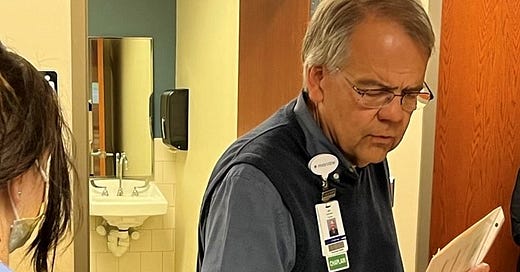Welcome back!
I, too, don’t know what to say.
I need to tell you something.
I read books about grief. Memoirs and stories and summaries of research. I read research articles and send out surveys. I come here every week with something that tries to be helpful. I talk to groups. I teach a course in pastoral care.
And then every week I sit in rooms where really hard things have happened. And I talk to family members. And sometimes, I get tears in my eyes.
And I don’t know what to say.
Hours after the conversations, I think, “Should I have said that?” Knowing, of course, that they won’t remember a thing I said.
And I hear about friends who are having a really hard time, and I forget to follow up.
There aren’t experts in grief support. If by expert we mean someone who is so good at finding words that the pain goes away, that grief is gone.
Grief isn’t that kind of thing.
+++
When people who work in hospitals don’t answer simple questions quickly, there’s a reason.
Hui-Wen Sato is a nurse in PICU (Pediatric Intensive Care Unit). She captures the struggle of many of us in “The Impossibility of Explaining a Day in the Life of PICU Nursing”.
I still don't know how to answer the question, "How is work?"
I show up to the church courtyard on Sundays the same way anyone else does after a full week. Full of things on my mind, wanting connection, not always sure how to build bridges in brief five-minute conversations with people I love, not sure how much other people want to hear about all the things on my mind, always wanting to be sensitive to giving time and weight to others' burdens from the week.
The Impossibility of Explaining a Day in the Life of PICU Nursing | The Heart of Nursing
+++
The blessing of the hands
I wrote this a couple years ago during Nurses Week. It’s still true this week.
+++
Today (5/9/23) we’re doing a thing called the “blessing of the hands.” It’s a tradition that goes back a long time.
For the past three years, our chaplains have gone to each of our units. Nurses (and other coworkers) gather in a small circle. We talk for a minute, we thank them, we put a bit of oil on their palms or the backs of their hands, and we ask God to bless the work of their hands.
I don’t like doing it.
Not because I don’t like calling down the blessing of God on the hands of people who serve. I love that.
I just don’t like feeling like crying while I’m doing it.
Like I am while I’m writing this.
Because I’ve watched those hands, or hands like them in the Neonatal ICU, holding a baby just breaths before death and hear a nurse’s voice saying, “I don’t think people know how much we love these babies.”
Because I’ve watched those hands, or hands like them in the Medical ICU, holding another hand, speaking quietly to a family member nearby. And then holding a stethoscope gently to verify that the heart isn’t beating any more. And I’ve seen the tears in the eyes outside the room. And I’ve watched the hands foam up and move to the room next door and start caring again.
Because I’ve watched those hands, or hands like them carrying bedpans. And offering hugs. And helping people who holler at them.
In the last month. I’ve seen this. And the one before. And the one before. And the one before. And the year before.
In all the arguments about numbers and percentages, about kids these days and about people not caring and all of our attempts to address big things, I watch individual nurses, people with a calling, care for individual people with pain.
I know. There are other stories, too. There are “but what about that time?” and “What about that one?” But these nurses, the ones with hands outstretched in front of me, with faces I’ve seen in moments that wreck us both?
Why wouldn’t I cry when I look at those hands? Why wouldn’t I bless them?
+++
If you have a friend who is a nurse share this with them. Or give them a hug. Or bless them.
Thanks.
See you next week
Jon





